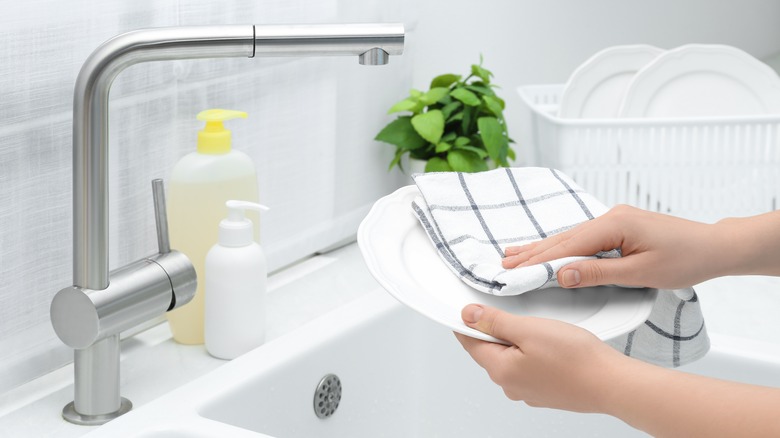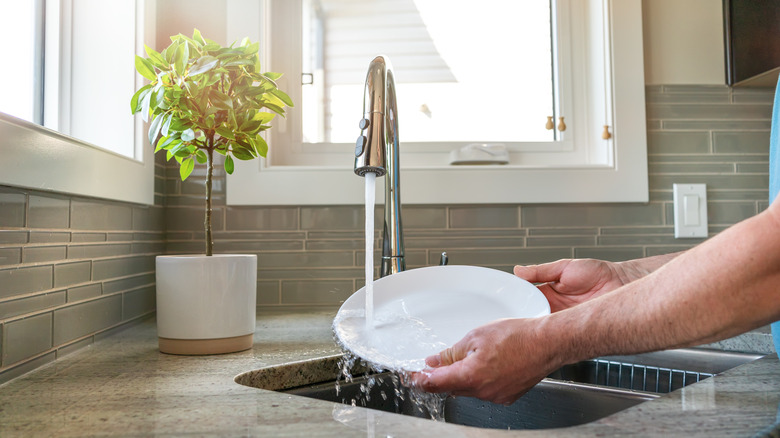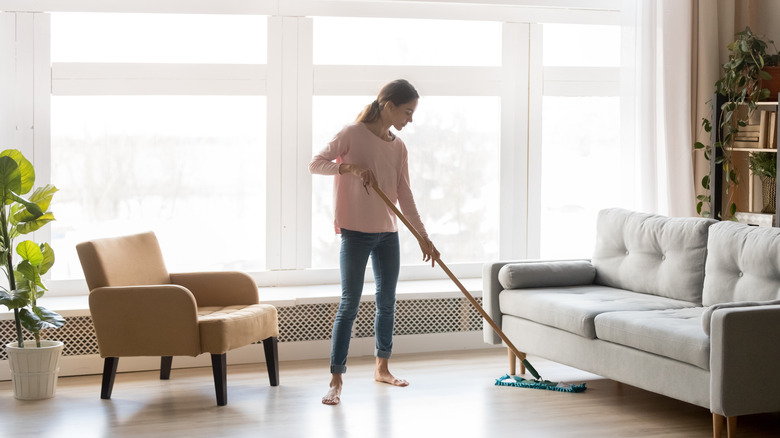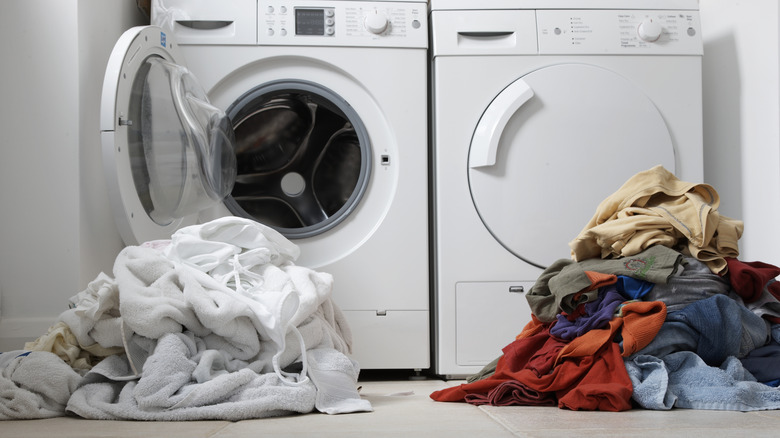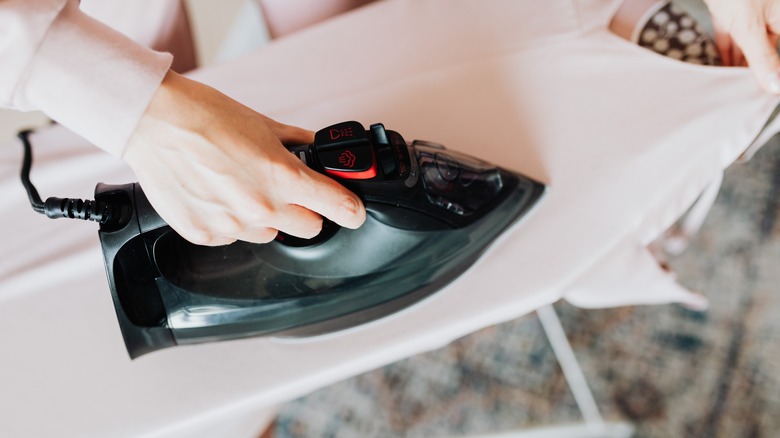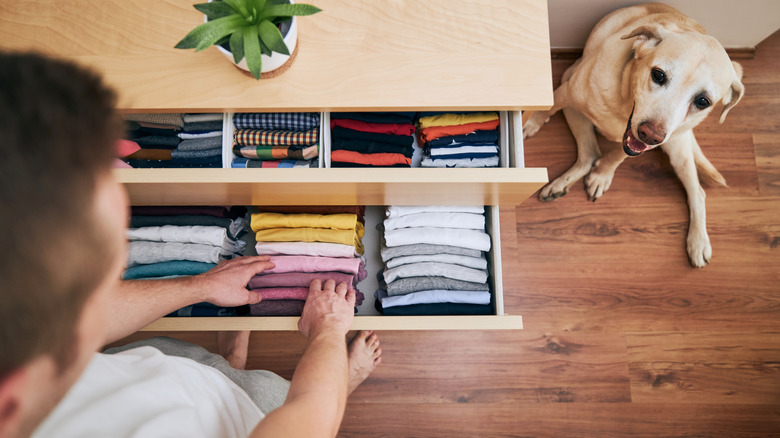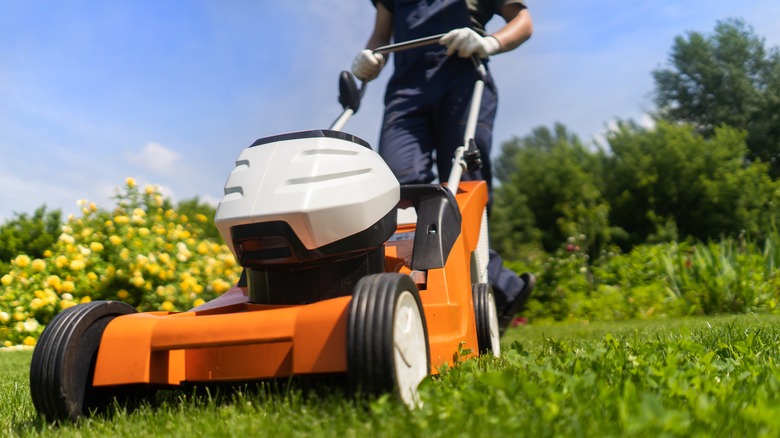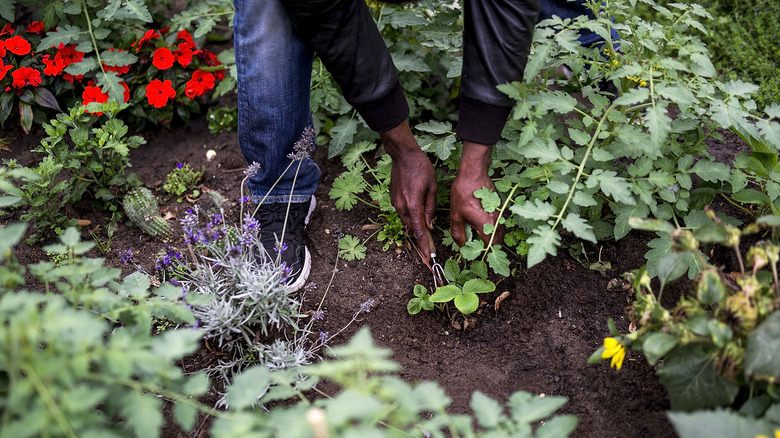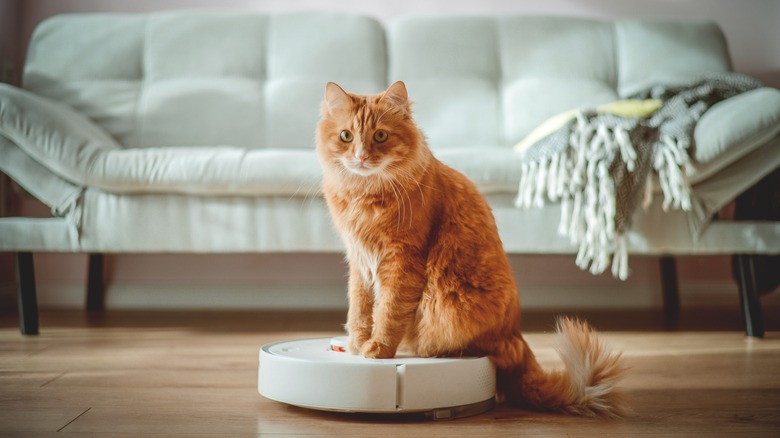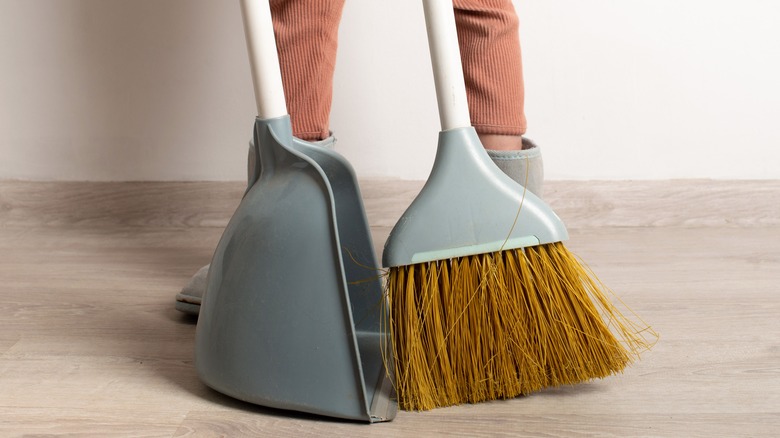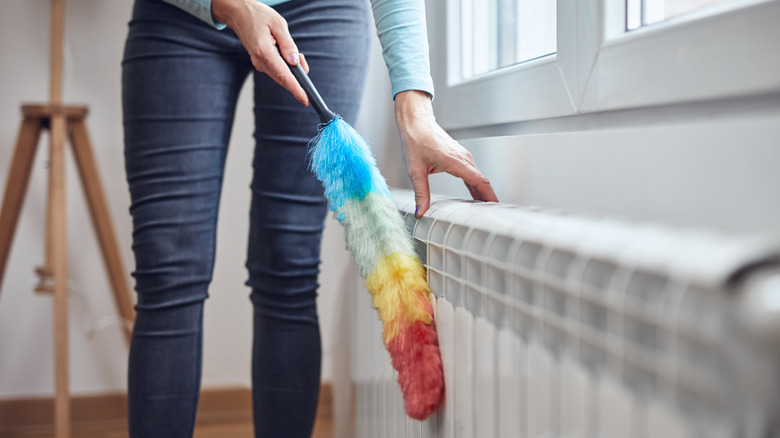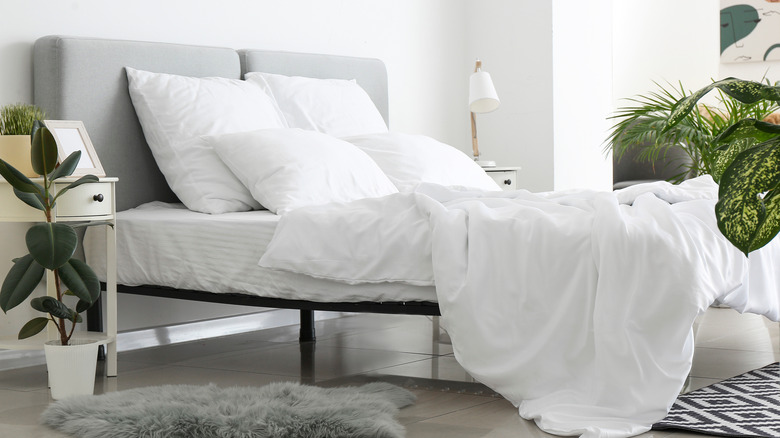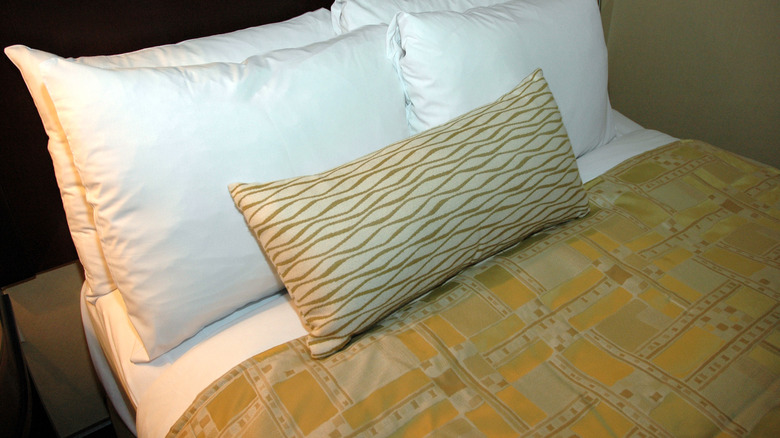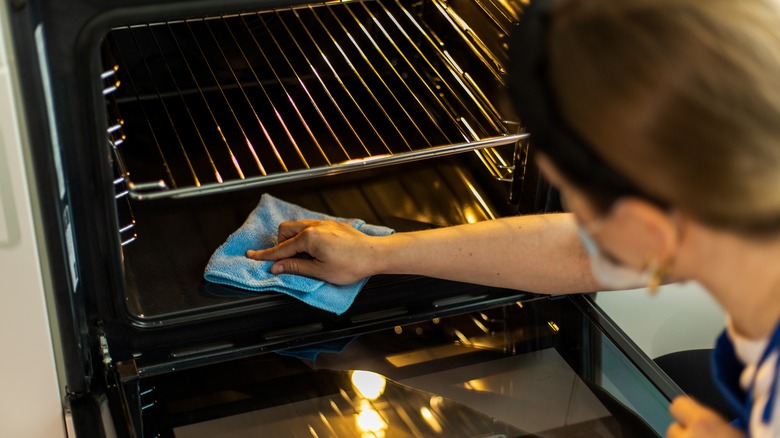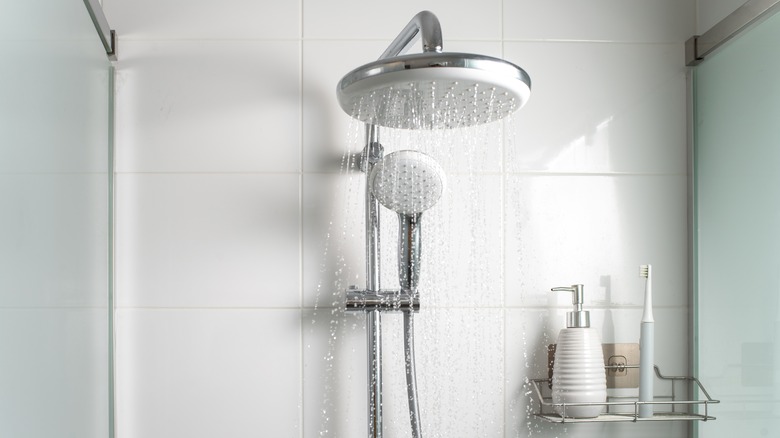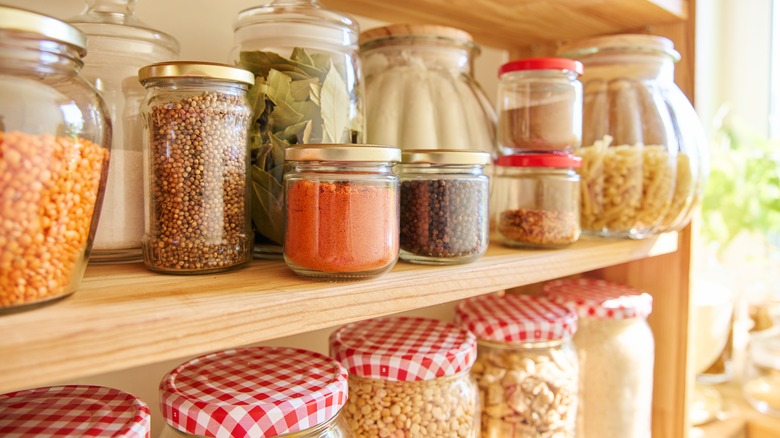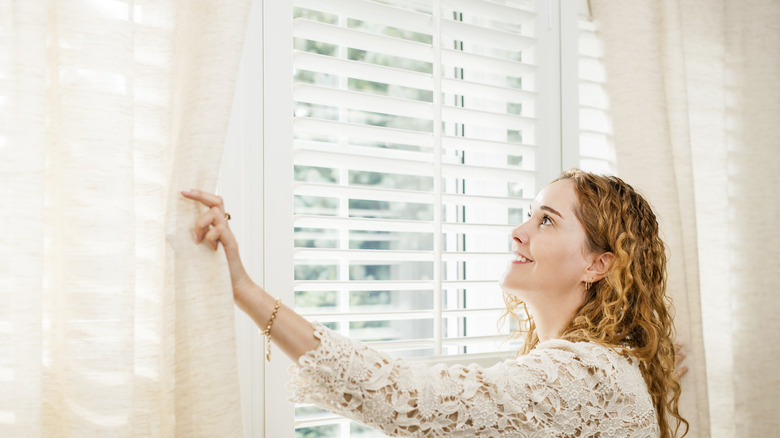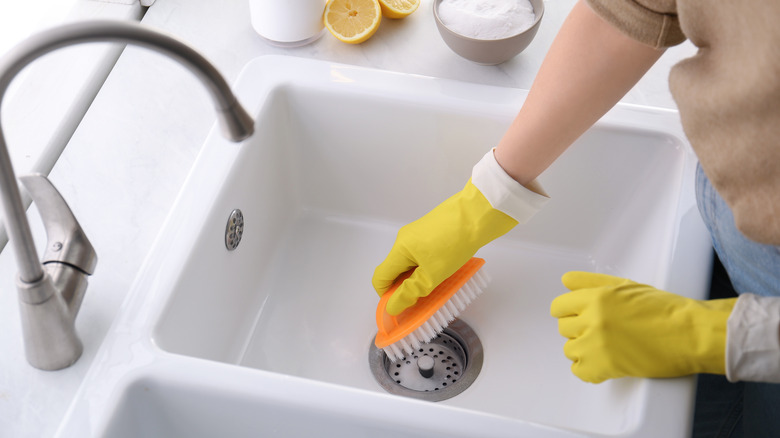Household Chores That Aren't Actually Worth Your Time
It seems like keeping our homes clean is a job filled with never-ending tasks. There are always dirty dishes in the kitchen and a stack of dirty clothes in the laundry room. There are reasons why we do these chores. They make our homes look nice, and clean and clutter-free homes help us feel less stressed. In fact, studies have shown that a clean home is better for our mental health. The thing is, you can keep your home looking neat and tidy without being swamped with daily chores.
When you don't have to rinse the dishes anymore, and you're skipping the ironing and bed-making, you will find you have more time on your hands for other things, like talking to friends, spending quality time with your family, and even just having some personal time to catch up on your favorite TV shows or magazines. So, before you start your next round of chores, consider some of them that are not worth your time — not today, anyway.
1. Stop hand drying your dishes
If you are one of those people who can't wait for hand-washed dishes to air dry, it's time to practice some patience and stop wasting time with that tedious task. If you invest in a nice dish rack to place your wet dishes, they will get ample airflow to allow for faster drying. On top of that, there are some health and environmental reasons to let those dishes dry on their own.
WebMD talked with Nancy Reed, RD, LD, about the benefits of airdrying. Reed says, "At home, it's always better to air dry your dishes than to use a dish towel, because a dish towel can harbor all sorts of bacteria. You wipe your hands with it, you use it to dry the counter, and then you use it to dry the dishes!" Of course, you could grab a fresh towel from the cupboard every time you do the dishes, but then you'd have even more mounds of laundry to do. You could also have separate towels for hands and dishes, but who will remember which is which after a few days? You should also skip paper towels, which aren't an environmentally friendly choice.
2. Stop rinsing dishes if you have a dishwasher
If you're an old-school dishwasher owner, you probably have grown accustomed to rinsing all of your dishes off before putting them into the dishwasher. It seems like in the early days of dishwashers, people washed the dishes by hand and then rewashed them in the dishwasher (a big waste of water, for one thing), but things are different now.
Newer dishwashers are equipped to deal with stuck-on gunk and food waste, though you still want to scrape off any excess food before you put it in to help prevent clogs or other issues. Our "new-fangled" dishwashers have turbidity sensors that have the purpose of determining how dirty the water is after the first cycle. Rinsing your plates can mess this sensor up, which makes your dishwasher less effective. It will think your dishes are clean and use less scrubbing power, leaving you with a batch of dirty dishes rather than clean ones.
3. Stop wet mopping your floors
Freshly mopped floors look nice and shiny, but there's definitely a better way to have nicely cleaned, non-carpeted flooring. Instead of grabbing your shaggy old mop and a bucket of water, consider spot-cleaning spills and messes when they happen and using a spray mop instead. Of course, this still means cleaning your floors, but it'll take less time if you're keeping spills cleaned and not having to deal with a stinky mop. Investing in a spray mop, like the Swiffer Wet Jet, will save you tons of time.
Plus, too much water on your floors can be damaging, meaning if you're using a traditional mop, you may want to follow up with a dry rag to suck up water before it gets below baseboards or sinks into porous tiles. You may also be pushing dirty water around instead of cleaning up the dirt from your floors when using the mop and bucket. You can clean more efficiently with a spray mop.
4. Stop washing clothing after one wear
Unless you splattered some bacon grease on your top or dribbled some coffee during breakfast, you can wear an article of clothing more than once before washing it. In fact, some clothing items shouldn't be washed after every wear because it can make them fade faster and cause their fibers to break down more quickly (like your jeans).
Different clothes require different washing frequencies. For example, you can wash skirts, sweatshirts, and dress pants after at least five wears, and wash bras, pajamas, and jeans after you've worn them three times. Of course, there are other factors, like washing your pajamas more often if you're suffering from night sweats caused by medications, illness, or menopause, or washing your sports bra after each use because you sweat a lot in it.
Basically, clothing that is worn right, tight on your skin — like underwear and tank tops — should be washed after each use (unless they're prone to breaking or becoming misshapen, like bras). Follow these tips and you'll be doing laundry less often.
5. Stop ironing your clothes
While some stuff needs ironing — like perhaps your work suit — other items can be skipped. That's not because you will wear them wrinkled. Instead, there are things you can do to keep them from wrinkling in the first place, nicing the need to painstakingly iron. Let's face it, every time you pull out that iron and board, you swear you'll never buy finicky fabrics again.
If you want less wrinkly clothing with less work, here are a few things to try. First, you can hang them to dry straight out of the washer. At times, the weight of a damp piece of clothing is enough to make it straighten itself out. You can also try tossing them in the dryer for a bit on low heat. Some dryers have wrinkle-release settings, so consult your manual to see if you have that option. Just be sure to remove them the second the dry cycle ends, or else the wrinkles will settle in. If you don't want to spend time steaming your wrinkly garments, try spraying them with a wrinkle-release spray and gently smoothing them down with your hand. That should help remove any remaining creases.
6. Stop folding your underwear
Unless you have some fancy undies that wrinkle easily, you can just toss your underthings into drawers sans all the struggle and dedication of folding. Yes, we know Marie Kondo taught you all the space-saving ways to fold clothing, including your undergarments, but we're telling you it's just wasting precious time you could be doing something else.
The thing is, underwear goes under things, so unless your panties are prone to wrinkles that might add discomfort to their wear, they don't have to look pretty. Rather than taking time to fold multiple pairs of knickers, toss 'em in the drawer as they are. They're not bulky pieces of clothing, so even unfolded, they're unlikely to take up too much space. For those silky, sexy ones, consider laying them flat in a small designated drawer instead of folding them (which still takes a bit less time).
7. Mow your lawn less often
Outdoor chores are just as important as indoor ones, so when it comes to staying busy, those warm months can mean even more stress and added items to the to-do list. Cut down on the work you're doing outside so you can have more time to play by mowing less often. Bonus: Letting your grass grow longer is actually good for the environment!
The USDA suggests waiting at least a few weeks between mowing to allow beneficial weeds, like dandelions, to flourish. While many folks aren't fans of these weeds, studies have shown that giving the flowering pests time to mature gives bees a better chance at survival. With this in mind, consider passing on the weed killers too. You'll, again, spend less time on chores while also helping the environment. When it is time to mow, don't mow your lawn too short, and be sure to pick the right time of day.
8. Oh, and cut down on the need to weed
Speaking of weeds ... this time-consuming task is no fun at all. Sure, you get to spend some time in the sun, but you end up covered in dirt and bug bites. If you want to banish weeds, especially in your flower gardens, there are some things you can do that will cut down on the time you spend kneeling and pulling them.
If you haven't put your garden in yet, consider placing a tarp or weed barrier down that will allow you to plant your stuff on top and keep the weeds below with no chance to grow through. However, if your garden is already planted and you're tired of picking weeds, you can still do something about it. Try putting down some mulch or stones. Not only will these make your plants and flowers stand out, but it makes it a struggle for weeds to grow through, and most of them die before they see the sunlight. Yes, it's a new chore, but this one-time task will save you from weekly trips outside to pull weeds.
9. Stop vacuuming as frequently
Depending on the color of your carpet, sometimes any little thing can stand out, making you want to vacuum every day. However, we're here to make a case for vacuuming less often. Of course, you could invest in a robot vacuum that does the work for you, but that depends on your home's layout and other factors — like if you keep certain doors shut or have multiple floors in your home. Plus, there's a chance that vacuuming less, in general, could be good for your carpet!
According to Dreametech, vacuums are harsh on carpets and even worse on certain fabrics (like wool). While it's common knowledge that dirt build-up is also bad for fibers, perhaps vacuuming a little less often is the key to balancing these things out. A couple of things you can do to reduce the need to vacuum is to stop wearing shoes around the house and take them off at the door. If you get cold feet or don't want guests walking around barefoot, have some house slippers around. You can also spot-clean your carpet by picking up things when they drop. If you're dealing with fallen crumbs or dirt, try vacuuming just that one spot, and leave the all-over vacuuming for once every two weeks.
10. Cut down on your need to sweep
Again, removing your shoes at the door is a key ingredient to cleaner floors. After all, dirt isn't the only thing you're dragging into your home on your shoes — you're also bringing in bacteria and other unhealthy substances found in the great outdoors.
Much like vacuuming, the amount of sweeping you need to do will be greatly lessened by not tracking in excess dirt on shoes, but there will still be other chances for dust and grime to find its way onto your wood, laminate, or tile floors. What you can do to save time is get a robot vacuum cleaner to do the work for you, and you can also spot sweep when you need to. Focus on sweeping the rooms that are more likely to get dirty faster, like the kitchen and the mudroom, and let lesser-used rooms sit longer between deep sweeps.
11. Stop some of your dusting needs
Dust can come into your house in many ways. Anything from your furnace to your AC unit to your windows can let dust in. Plus, we're all shedding skin each day, which adds to that dust.
Cutting down on dust doesn't have to mean lengthy spraying and dusting off every nook and crevice in your home. Yes, you may want to do a deep clean during good ol' spring cleaning, but in the interim, you can try some tricks that cut down on your need to dust, or at least how much time you spend doing it. First, banish the hand duster that's moving the dust back into the air and grab a microfiber cloth instead to pick it up. To make it work, just get it damp first. For bookshelves, keep your books slid to the front of your shelves, leaving no space for dust to collect. You can use this trick in the pantry, too. Get your ducts cleaned to help keep your furnace from blowing dust into the air. And lastly, run an air purifier.
12. Stop dealing with paper clutter
Paper clutter is probably one of the most annoying types of clutter to deal with. For the most part, our stacks contain things we can't get rid of, like receipts and tax papers. However, the internet has given us a great way to let go of all those sheets and clean up our homes. It's time to nix the filing cabinet and go digital.
Beyond digitizing your bills so you don't get paper waste sent to your home, you can also use direct deposit to cut down on having to keep track of check stubs. To defeat the monster known as junk mail, cancel magazine and catalog subscriptions that come in the mail and check them out online instead. For the papers you can't let go of, keep them organized in manila envelopes with a note explaining what you'll find within, and tuck them away in a storage bin in your closet. You can also scan them into your computer and keep them in cloud storage for access from anywhere.
13. Toss your top sheet (maybe)
Not everyone utilizes the top sheet that comes with sheet sets; some find it a tiresome piece of fabric that adds to how much laundry they have to do each week. To cut down on chores, you could ditch this sheet, but it seems there may be some pros and cons to doing so.
Bed Threads claims millennials are the ones ditching their top sheets because they find them messy, an added cost they don't want to deal with, and just one more annoying step when making a neat and tidy bed. However, there are reasons why top sheets are a thing in the first place. For one, they add an extra hygienic layer between you and your comforter, and we all know sheets are easier to clean than bulky blankets. If you ditch your sheet, use a duvet cover instead. They're also nice on hot nights when you want some cover, but not much. So if you're struggling with laundry, ditch the top sheet. But if it adds comfort while you're sleeping, keep it.
14. While you're at it, stop making the bed
Then again, you can cut out one tedious daily chore each morning by not making your bed. What's the point anyway? You'll just mess it up again when you go to bed. Perhaps if you're expecting company that'll be visiting that room, you may want to tidy things up. But if it's just you, or you're already in a relationship, and neither of you cares about making the bed, why waste time?
The Washington Post reported on a study claiming that skipping this chore could be beneficial. That's because nasty little dust mites thrive in warm, dark spaces like well-made beds. If your bed is messy, they have fewer places to hide, breed, and make your bed their habitat. So, when you get up tomorrow morning, leave your sheets and blankets in shambles. Your sinuses may even thank you for it.
15. Stop watering your houseplants
While not all plants need to be watered daily, those that need regular watering can add to your daily chores. And if you're a plant lover, you probably have at least a dozen little green babies around your home in need of care. When picking plants that don't need as much attention, lean into succulents. For the plants you already have that need regular attention, try a few watering tricks to reduce your need to check them daily.
You can use ice cubes to water them, which will melt slower in colder months (unless you have the heat cranked up high). There are self-watering planters that let the plants suck water up through their roots when they need a drink (but be sure to do some research on your plant, as some don't like these types of devices). You can also use self-watering globes that add a little color and whimsy to your greenery and water them, as needed, from the top of the soil.
16. Stop cleaning your oven so often
If you're cleaning your oven more often than every three months, you're doing it too much. In fact, Better by Today spoke with Philip Tierno Jr., NYU School of Medicine's clinical professor of microbiology and pathology, about germs and cleaning your kitchen. Tierno said, "The inside of the oven should be cleaned every 3 months, or when you notice burnt on food or smoke when you are baking."
So, instead of wasting time cleaning your oven every month or two, simply wipe away any spills, spot clean with a Magic Eraser, or vacuum up any food bits that have fallen and burned at the bottom of the oven. Basically, you want to keep more things from burning or getting stinky the next time you do any baking. And, for the stovetop, spray some white vinegar, let it sit for a couple of minutes, and wipe it down with a rag to give it a shiny and clean appearance.
17. Stop cleaning your shower so often
While experts say you should be cleaning your shower once a week, there is a way you can cut down on how often you need to do a deep clean. If you'd rather give your shower major focus once a month instead of four times a month, you will want to get one of those dish wands that hold soap in them and keep it in your shower.
Though you'll still be cleaning your shower regularly, you'll be able to do it while you're in there taking your shower. With the sponge wand prefilled and in an easy-to-reach space, you can quickly spot-clean your shower while rinsing off. Because these wands can scrub gunk off dirty dishes, they're sure to get all of the soap scum off your tiling and more. When it's finally time to deep clean, you can make things easier by spraying your shower with cleaner after a hot shower. That way, the grime is loosened up from the steam.
18. Cut down on food waste in the pantry
Shelf-stable pantry foods tend to have longer lifespans than foods that need to be refrigerated or frozen. A well-stocked pantry ensures you will always have the staple foods you need to create healthy meals and use the stuff in your fridge and freezer.
The biggest thing you can do to keep from wasting food is to organize your pantry. Once you have it organized, restock it using the established system so it doesn't get cluttered when new groceries are added. A one-time sweep to check expiration dates will ensure you have less stuff to throw out the next time you deep clean. To keep things organized, put things in order of expiring first to last, with items that need to be used the soonest in front. Basically, you're stocking your pantry as they do at the grocery stores!
19. Stop overstocking on things
Speaking of stocking up on stuff, you can defeat clutter and reduce the waste you're accumulating by not overstocking on things. If you want fewer chores, it makes sense that owning fewer things would help. And, while we all may still be a little traumatized by the great toilet paper shortage of 2020, there aren't many things that we can't find readily available in stores or online when we find we're running low.
Some things are worth stockpiling, but do you really need 10 bottles of shampoo and a basement full of kitty litter? If something is on sale once, chances are it will be on sale again, so don't feel pressured to buy an excessive amount. Remember, things like skincare, soaps, and cleaning products have expiration dates. Their ingredients break down over time, making them less effective. So having three jugs of laundry detergent stockpiled isn't the deal you think it is. It's better to buy what you need when you need it, especially if you find it hard to organize your clutter.
20. Don't open your blinds and curtains each morning
This tip will help your home be more temperature efficient while also cutting down on your morning routine. While you may long for sunshine and enjoy the extra light in your home, those open shades let heat inside if it's hot outside. To keep your home cooler in the summer, be sure your shades are shut before the sun starts to shine. If you need a little sunshine, take a break and step outside to enjoy the fresh air.
On that note, you also want to keep your shades shut in the winter unless you have efficient windows. The curtains and shades help keep the cool air from seeping through older windows. But, if your windows are newer, you could let that moment of winter sun in to help warm things up and give you a little boost of some much-needed vitamin C.
21. Stop cleaning your sink every time you do dishes
It's a fact that the kitchen sink gets dirty. You're washing gunk and grime off of dishes in there regularly. If your sink has a garbage disposal, you're also likely skinning veggies over the basin. The thing is, you don't have to scrub clean your sink every time you do dishes. Do you clean your bathroom sink every time you brush your teeth? Probably not.
While you want to be conscious of bacteria buildup, Lisa Hurley, the marketing manager for kitchen sinks at Kohler, told The Washington Post that you could wait up to 10 days before cleaning your sink. However, if you're dealing with raw meat, you will want to disinfect the sink right after. But even then, you want to take it easy. "I would say that less is more," Hurley said, recommending dish soap and water for the task. She recommends skipping cleaning products, and shared that even vinegar could be too harsh for most basins.


